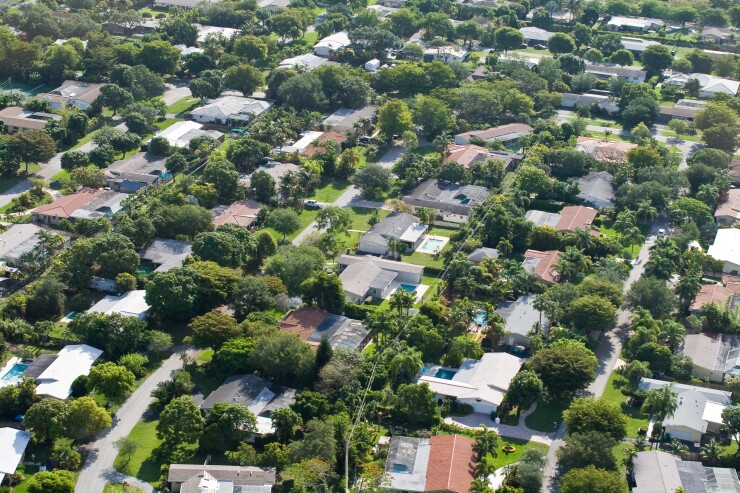Real estate agent Kevin Dickenson's clients had a deal to sell their $3 million Boca Raton house in March.
Then the coronavirus pandemic exploded, and suddenly the home's buyer announced he wanted out.
Did the sellers let the buyer walk?
Far from it. The sellers hired a lawyer, who crisply informed the buyer that legal action would commence if he didn't go through with the deal.
The buyer backed down, and the closing was rescheduled for April 10.
With the onset of the pandemic, real estate agents say deals that were in the works are encountering all types of problems, creating havoc in the market.
The biggest issue: Buyers trying to back out of purchase contracts.
"I'm getting calls left and right from people wanting to get out of deals any way possible, and sellers are trying to hold their feet to the fire," said Gary Nagle, a Juno Beach-based real estate lawyer.
Nagle said he had a client from Boston who asked to get out of a deal, and another from Connecticut who also sought an exit. Both deals are for second home purchases in Palm Beach County.
But can buyers cancel due to COVID-19? Real estate lawyers said there isn't a clear answer.
A commonly used contract created by the Florida Association of Realtors and the Florida Bar, dubbed FAR BAR, contains a provision called force majeure. The Latin term means an unforeseeable action that prevents someone from fulfilling a contract.
The contract lists acts of God such as hurricanes or floods. But it does not list pandemics.
To truly unwind the contract, the action has to extend past 30 days. Nagle said he thinks that travel restrictions to Florida and shelter-in-place orders may allow force majeure to apply because buyers may not be able to perform final walk-through tours of their purchase, as the contract dictates.

Paul Krasker, a West Palm Beach lawyer, concurred.
"Somebody from New York, who is at high risk, can make the strong argument that this is force majeure and the risk of serious long-term injury or death outweigh any contractual obligations to attend that preclosing walk through," Krasker said.
But Fort Lauderdale lawyer Irwin Gilbert disagreed.
"We engage in transactions that are almost virtual transactions," Gilbert said. "If somebody is at a distance and it's not safe to travel, they could delegate that responsibility to a responsible agent, even if it's not delineated in the contract."
In the case of the Boca Raton home, Dickenson said Gilbert helped close the sale.
The timing was critical, said Dickenson, an agent with Berkshire Hathaway HomeServices Florida Realty on Palm Beach.
The sellers needed the money from the Boca Raton sale to pay for the purchase of a Lake Worth house. And the owner of that house, in turn, needed the money to buy a house in West Palm Beach.
"It's a domino effect," Dickenson said.
Although the buyer of the Boca Raton house invoked the force majeure provision of the contract, Gilbert said he never wanted to cancel. Instead, the buyer was angling for a better deal, and he offered to close if the price dropped, Gilbert said.
The discount sought by the buyer? $700,000, Dickenson said.
After Gilbert's client refused to modify the price and made clear litigation would commence, the buyer agreed to pay the contract purchase price, Gilbert said. But he also paid for the delay, including the sellers' attorneys fees, additional property taxes and mortgage interest, Gilbert said.
Gilbert said these squeeze tactics by buyers are becoming widespread. "I'm hearing from colleagues this is starting to happen frequently."
Some buyers who fear falling home values, or who do not think they will be able to pay a mortgage due to the economy, may be able to strike a deal with sellers to forfeit deposits in exchange for letting them walk away.
"They're saying, 'I'm going to give up the deposit and I'm not going to fight about it,'" Nagle said.
There are other issues.
Nagle said a lender tried to withdraw a loan commitment to finance a large mortgage, but backed down when Nagle sent the bank a letter insisting on the funding.
And while some condominiums are allowing buyers to do a walk-through under certain restrictions, such as only one person at a time, others are banning anyone from entering the building unless they are an owner.
Irwin said he didn't think banning prospective buyers was lawful, even in an emergency. "I think the condo associations are exposing themselves to liability for damages associated with failed transactions," Gilbert said.
There are some bright spots in the real estate market.
Agents said some people seeking to flee the Northeast are making snap decisions to buy Palm Beach County homes, almost sight unseen.
John Dimitri, a real estate agent with Dalton Wade Real Estate Group, recently listed a home in Palm Beach Gardens on a Saturday morning.
By the evening, the house was under contract to a woman from Connecticut for $100,000 more than the $399,000 asking price.
Dimitri said the buyer never saw the house in person, but she saw photographs, and her agent gave her a virtual tour via the video app, FaceTime.
Dimitri said the woman had been considering moving to Florida to be near her grandchildren, but she couldn't quite make the decision until now, Dimitri said.
With the coronavirus pandemic, "she finally decided she was ready to go," he said.





